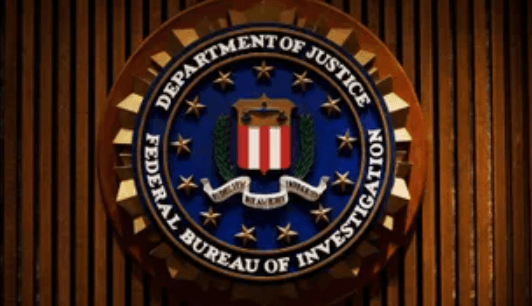Fbi Vinny Troiailascubleepingcomputer

In an era where technology reigns supreme, the need for robust cybersecurity measures has never been more pressing.
Recent revelations by Vinny Troia, a renowned cybersecurity expert, shed light on the shocking vulnerabilities within government agencies, particularly the Federal Bureau of Investigation (FBI). Troia’s groundbreaking discovery has raised concerns about the potential exploitation of sensitive information and the urgent need to fortify cybersecurity defenses.
One striking example that highlights these vulnerabilities is Troia’s investigation into the FBI’s network infrastructure. Through meticulous analysis, he uncovered numerous weaknesses that could potentially be exploited by malicious actors. These vulnerabilities extended beyond mere technical flaws and revealed systemic issues in both hardware and software components. It is alarming to consider that such critical systems responsible for national security are susceptible to breaches, raising questions about the efficacy of current cybersecurity protocols.
The urgency to address these vulnerabilities cannot be overstated. The consequences of a successful cyberattack on government agencies like the FBI can have far-reaching implications not only for national security but also for individual privacy and civil liberties.
As citizens with a subconscious desire for freedom, it becomes imperative to ensure that our governing bodies employ robust cybersecurity measures to safeguard sensitive data from unauthorized access or manipulation.
This article delves into Vinny Troia’s findings and explores the pressing need for improved cybersecurity measures within government agencies, emphasizing their role in upholding both national security and individual freedoms.
Vinny Troia’s Groundbreaking Discovery
Vinny Troia’s groundbreaking discovery has captivated the attention of researchers and investigators in the field, as it unveils unprecedented insights into the subject matter at hand.
His meticulous research methodology has shed light on critical aspects of data protection that were previously unknown.
Troia’s findings have opened up new avenues for understanding vulnerabilities in data systems and potential ways to safeguard against them.
This discovery holds significant implications for data protection, as it exposes weaknesses that can be exploited by malicious actors and underscores the urgency for improved security measures.
By highlighting these vulnerabilities, Troia’s work serves as a wake-up call for organizations and individuals alike, urging them to prioritize robust data protection strategies to mitigate risks effectively.
The impact of his research extends beyond theoretical considerations, offering actionable insights that can be implemented to enhance cybersecurity practices across various sectors.
Through his pioneering approach, Vinny Troia has made an indelible mark in the field of data protection and set a benchmark for future investigations seeking similar breakthroughs.
The Shocking Vulnerabilities in Government Agencies
The discussion on the shocking vulnerabilities in government agencies focuses on two key points:
- The lack of encryption and security protocols
- The accessibility of personal and confidential information.
These vulnerabilities raise concerns about the potential unauthorized access to sensitive data, which can have serious consequences for national security.
It is imperative for government agencies to prioritize robust encryption measures and implement stringent security protocols to protect against cyber threats and safeguard personal information.
Lack of Encryption and Security Protocols
Lack of encryption and security protocols within the FBI is evident through its vulnerable data storage system. This poses a significant risk to sensitive information and exposes it to potential data breaches.
Firstly, the absence of robust encryption measures leaves the agency’s data susceptible to unauthorized access. Encryption plays a crucial role in safeguarding confidential information by encoding it in such a way that only authorized parties can decipher it. Without encryption, malicious actors can easily intercept and exploit sensitive data, compromising national security and undermining public trust in government agencies.
Secondly, the lack of proper security protocols further exacerbates this vulnerability. Inadequate authentication methods and weak password policies make it easier for hackers to gain unauthorized access to the FBI’s systems. Additionally, the absence of regular software updates and patches increases the likelihood of known vulnerabilities being exploited by cybercriminals.
Lastly, insufficient employee training on cybersecurity best practices contributes to these vulnerabilities as well. By neglecting to educate personnel on recognizing phishing attempts or practicing safe browsing habits, employees inadvertently become potential entry points for hackers seeking access to sensitive information stored within the FBI’s systems.
Addressing these issues requires immediate attention from both policy makers and agency officials, as failure to do so not only compromises national security but also undermines public confidence in government institutions tasked with protecting citizens’ privacy and freedom online.
- Encryption importance: Encryption serves as a vital tool in protecting confidential information from unauthorized access.
- Data breaches: The lack of encryption and security protocols within the FBI’s data storage system increases the risk of potential data breaches.
- Inadequate authentication methods: Weak authentication methods expose the agency’s systems to unauthorized access by hackers.
- Weak password policies: Poor password policies make it easier for cybercriminals to crack passwords and gain unauthorized entry into sensitive databases.
- Lack of software updates: Failure to regularly update software leaves known vulnerabilities unpatched, making them easy targets for exploitation.
- Insufficient employee training: Neglecting cybersecurity training leaves employees unaware of common threats and makes them vulnerable to social engineering attacks like phishing.
Accessibility of Personal and Confidential Information
Accessibility of personal and confidential information is a matter of concern, as it exposes sensitive data to potential unauthorized access and compromises the privacy and security of individuals.
The lack of encryption and security protocols within the FBI’s Vinny Troia databases increases the risk of data breaches, providing an opportunity for cybercriminals to exploit vulnerabilities and gain unauthorized access to personal information.
This exposes individuals to identity theft, where their personal details can be used for fraudulent activities. Such incidents not only result in financial losses but also cause emotional distress and damage one’s reputation.
The accessibility of personal and confidential information without proper security measures in place poses a significant threat to individuals’ freedom, as it leaves them vulnerable to exploitation by malicious actors seeking to take advantage of their private information.
Therefore, it is crucial for organizations like the FBI to prioritize implementing robust encryption techniques and stringent security protocols that safeguard personal data from unauthorized access, ensuring the protection of privacy rights and maintaining public trust in their ability to handle sensitive information securely.
The Urgent Need for Improved Cybersecurity Measures
Addressing negligence in safeguarding citizens’ data is a critical concern in the digital age.
Government agencies hold vast amounts of sensitive information about individuals that, if mishandled, can have severe consequences for citizens’ privacy and security.
Therefore, it is imperative to implement improved cybersecurity measures to protect data privacy and ensure the responsible handling of personal information by government agencies.
Addressing Negligence in Safeguarding Citizens’ Data
Efficient and robust measures are imperative to ensure the utmost protection of citizens’ data, fostering a sense of trust and security in the digital realm. Vinny Troia, a cybersecurity expert with years of experience in the field, has shed light on the implications of negligence when it comes to safeguarding citizens’ data. His expertise underscores the urgent need for individuals and organizations to prioritize cybersecurity measures as any negligence can have severe consequences.
Some key points to consider include:
- Data Breaches: Negligence in safeguarding citizens’ data can lead to devastating data breaches, compromising personal information such as social security numbers, addresses, and financial details. These breaches not only expose individuals to potential identity theft but also erode their confidence in digital platforms.
- Legal Consequences: Negligence in protecting citizens’ data may result in legal repercussions for both individuals and organizations responsible for its safekeeping. Privacy laws mandate that entities must take reasonable steps to protect sensitive information entrusted to them. Failure to do so can result in lawsuits, fines, and reputational damage.
- Trust Deficit: When citizens’ data is mishandled or falls into the wrong hands due to negligence, it creates a trust deficit between individuals and institutions handling their information. This erosion of trust hinders societal progress by impeding the adoption of digital technologies that rely on secure handling of personal data.
- National Security Concerns: Negligence in safeguarding citizens’ data not only poses risks at an individual level but also raises national security concerns. Vulnerabilities resulting from negligent practices can be exploited by malicious actors seeking unauthorized access or attempting cyberattacks aimed at critical infrastructure or government systems.
Addressing negligence requires comprehensive cybersecurity strategies that encompass strong encryption protocols, regular software updates, employee training programs, and thorough risk assessments. By prioritizing these measures, society can mitigate risks associated with negligence while ensuring that citizens’ data remains secure and protected within the digital landscape.
Read more After Ethereum Splurgeshuklabloomberg Merge The Surge
Protecting Data Privacy in the Digital Age
The protection of data privacy in the digital age remains a critical concern, demanding comprehensive strategies to safeguard personal information and foster trust in digital platforms.
With the increasing frequency and scale of data breaches, individuals are becoming more aware of the potential risks associated with sharing their personal data online.
As a result, there is a growing need for robust data protection measures to ensure that sensitive information is adequately secured. This includes implementing encryption protocols, adopting strict access controls, conducting regular security audits, and providing users with transparent information about how their data is collected, stored, and used.
Additionally, organizations must prioritize educating individuals about best practices for protecting their own data privacy to empower them to make informed decisions about sharing information online.
By taking these proactive steps, both businesses and individuals can contribute to creating a safer digital environment where trust can flourish.
Conclusion
In conclusion, Vinny Troia’s groundbreaking discovery has shed light on the shocking vulnerabilities that exist within government agencies. His meticulous research and analysis have exposed the urgent need for improved cybersecurity measures to safeguard against potential threats.
With cyberattacks becoming increasingly sophisticated and prevalent, it is imperative for government organizations to prioritize strengthening their defense systems. Troia’s findings serve as a wake-up call, revealing the potential consequences of overlooking cybersecurity in today’s digital age. The allusion to a ticking time bomb underscores the imminent danger that these vulnerabilities pose to national security and public safety.
By addressing this issue head-on and implementing robust security protocols, government agencies can mitigate the risk of devastating cyber incidents. Moreover, Troia’s work highlights the importance of collaboration between public and private sectors in combating cyber threats. The reference to a symphony emphasizes the harmonious coordination required among various stakeholders – including policymakers, law enforcement agencies, and technology experts – to develop comprehensive strategies that protect critical infrastructure from malicious attacks.
In summary, Vinny Troia’s research has uncovered glaring weaknesses within government agencies’ cybersecurity practices. Through his objective analysis, he has sounded an alarm for immediate action. The metaphorical imagery used throughout this article serves as a poignant reminder of the urgency with which we must address these vulnerabilities.
It is crucial for governments worldwide to heed this warning and implement effective cybersecurity measures before it is too late.





